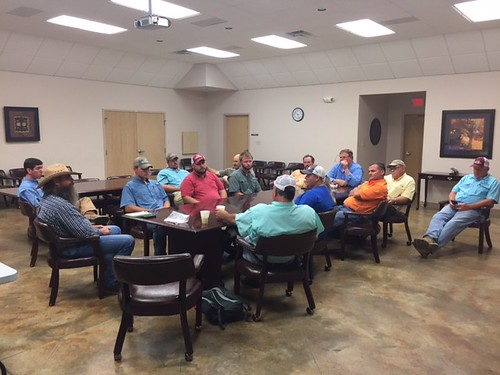Extension educators ready new crop of agents to serve their counties
By Ryan McGeeney
U of A System Division of Agriculture
July 7, 2017
Fast Facts:
- Both new and experienced CES agents benefit from inservice training
- Meetings designed to help new agents design their own educational programs
(340 words)
(Download this story in MS Word here.)
JONESBORO, Ark. – As summer in Arkansas hits full speed and growers begin to turn their thoughts from planting and look ahead toward harvest, the University of Arkansas System Division of Agriculture’s Cooperative Extension Service is focused on readying new agents to best serve the needs of constituents in their respective counties.
Wednesday, Hank Chaney, Area Agriculture and Natural Resources Specialist for the Division of Agriculture, brought together 17 Cooperative Extension Service agents, many of them recent additions to the ranks of the Division of Agriculture’s outreach efforts, for a day’s training focused on cotton, and the many questions growers are likely to have as the crop ages toward fruition.
“We’ve had various training days like this throughout the calendar year,” Chaney said. “We just try to focus in on something that’s hot at the time, and work with a specialist to set it up. We go look at plots or grower fields, if possible.”
Bill Robertson, extension cotton agronomist with the Division of Agriculture, was among the cadre of specialists who attended the meeting, and lent his expertise on the crop, which has seen an increasing return to favor among growers during the last year. He said “inservice days” such as the one held Thursday serve to bolster the Division of Agriculture’s institutional knowledge among both specialists and agents, as well as help new agents feel more comfortable about meeting the needs of growers in their respective counties with relatively little direction from state-level administrators.
“A lot of times, when you’ve got an agent fresh out of school, you’ve had someone telling you where to go, what to do and when pretty much your whole life,” Robertson said. “As an agent, you’re making a lot of decisions without a lot of direct supervision, and we want to help people learn how to do that.
Robertson said one of the goals of these sessions is to help agents develop educational programs of their own.
To learn about row crops in Arkansas, contact your local Cooperative Extension Service agent or visit www.uaex.uada.edu.
About the Division of Agriculture
The University of Arkansas System Division of Agriculture’s mission is to strengthen agriculture, communities, and families by connecting trusted research to the adoption of best practices. Through the Agricultural Experiment Station and the Cooperative Extension Service, the Division of Agriculture conducts research and extension work within the nation’s historic land grant education system.
Pursuant to 7 CFR § 15.3, the University of Arkansas System Division of Agriculture offers all its Extension and Research programs and services (including employment) without regard to race, color, sex, national origin, religion, age, disability, marital or veteran status, genetic information, sexual preference, pregnancy or any other legally protected status, and is an equal opportunity institution.
# # #
Media Contact: Mary Hightower
Dir. of Communication Services
U of A Division of Agriculture
Cooperative Extension Service
(501) 671-2126
mhightower@uada.edu
Related Links
